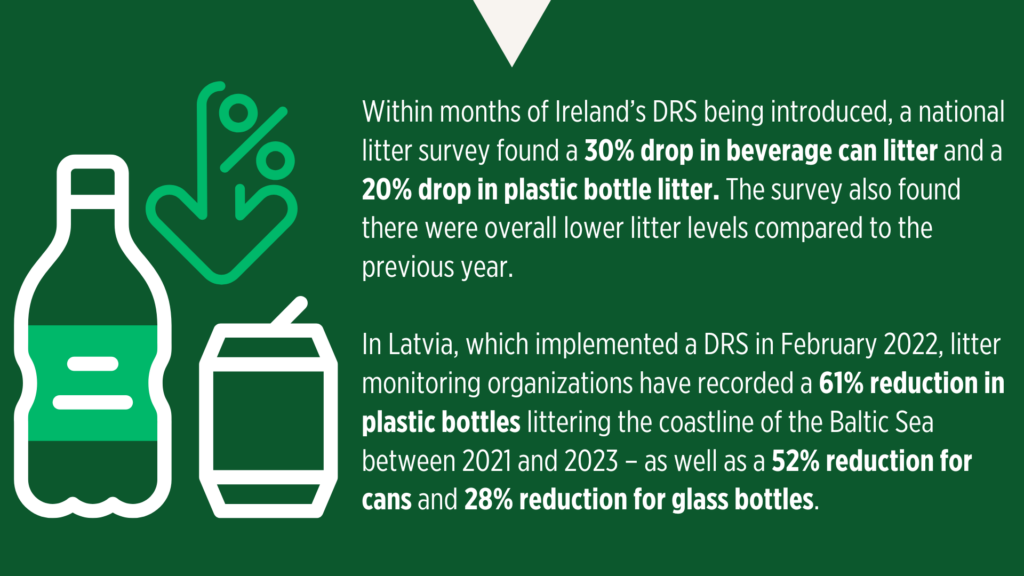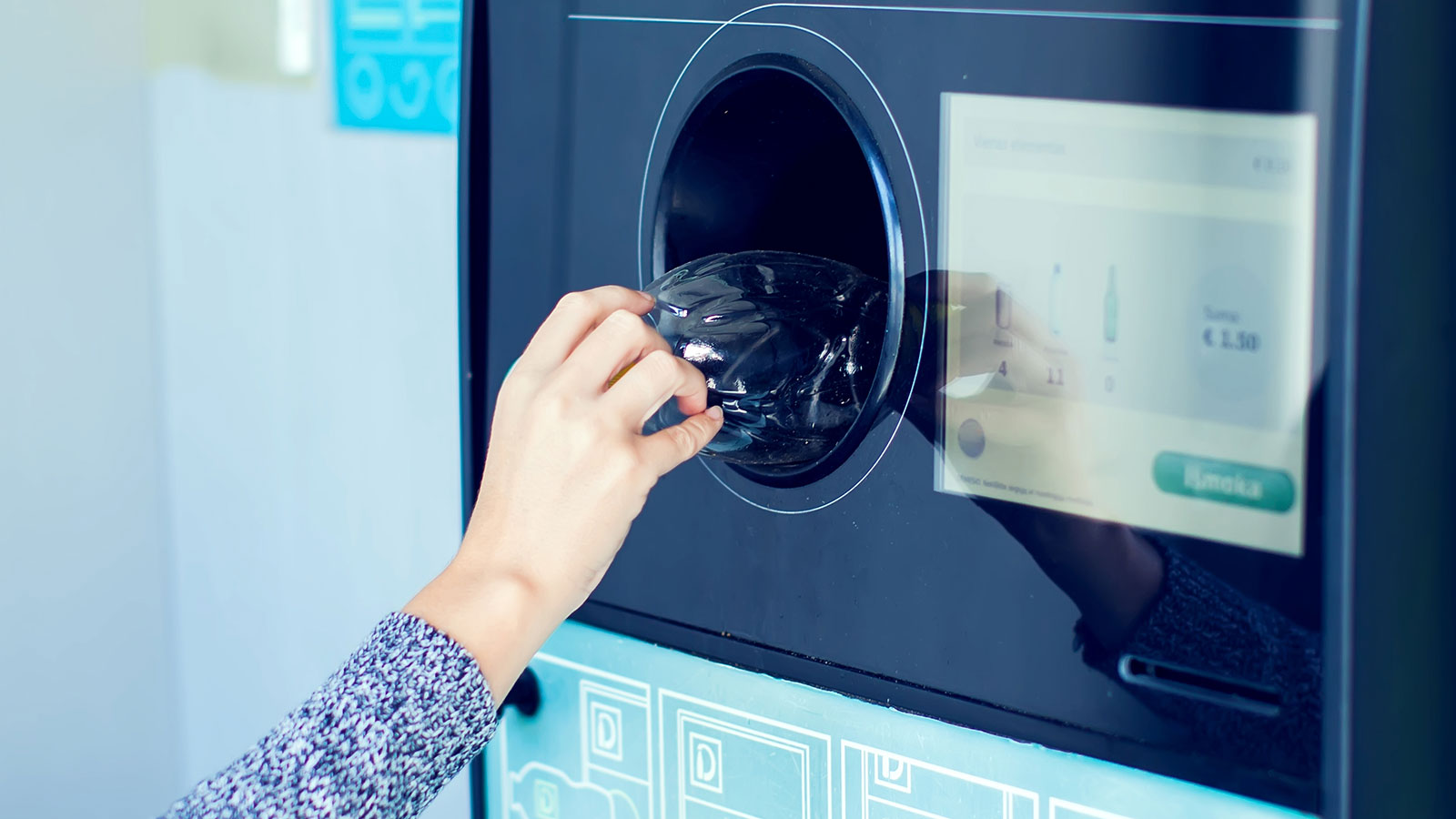This article was originally published in Business Green on November 25th 2024.
Over 30 billion single-use drink containers are purchased annually by consumers in the UK, comprising 12 billion plastic bottles, 14 billion cans, and 5 billion glass bottles. However, government figures show that only 70–75% of these are being collected, with the remaining billions sent to landfill, incinerated or littered.
The impact of this failed system is clear in communities across the country: dirty streets, litter-strewn parks and a polluted natural environment. Shockingly, just last month a clean-up operation of Eryri (Snowdon) found more than 2,700 pieces of rubbish, much of it consisting of drinks litter.
Thankfully, we have never been closer to a solution to tackling the scourge of drinks container waste. The UK Government reasserted last week that it is fully committed to a deposit return scheme (DRS) finally launching in England in October 2027 and similar commitments have been made by the Scottish Government and DAERA in Northern Ireland.
Following years of consultations and legislative activity, the final piece of the enabling legislation for England and Northern Ireland has just been laid in the UK Parliament. The scheme enjoys cross-party support; it has been great to see enthusiastic backing from new Circular Economy Minister Mary Creagh MP, and both the Conservative and Liberal Democrat manifestos committed to developing DRS.
The case for deposit return systems
One of the primary advantages of the scheme will be the positive impact on litter. Luckily, we don’t have to look far for evidence of this in practice. In Ireland, the recent annual Coastwatch autumn survey found “a massive reduction” in plastic bottles and aluminium cans washing up on shorelines following the introduction of its DRS in February. In Latvia, independent litter monitoring organisations found a 61% reduction in plastic containers littering the coastline of the Baltic Sea between 2021 and 2023 following the introduction of its DRS.

DRS works because it places a monetary value on items which have always been perceived as worthless, directly incentivising the collection and return of these items. Some stakeholders have instead suggested a doubling down on the tired approach of anti-litter campaigns and fines, while these have their place the idea that they will deliver anything like the same impact as DRS is simply not borne out by the evidence.
DRS will also play a vital role in boosting recycling rates and will introduce a target of 90% collections for drinks containers over three years. This will mean a lot less litter and a lot more recycling.
Why deposit return systems work: Evidence from the UK and abroad
Reloop’s assessment of schemes around the world shows that collection rates for beverage containers are consistently significantly higher in jurisdictions that have DRS, with Germany showing the best results at 98%. In fact, we found that nearly every European country with DRS for single-use beverages reports recycling rates of over 85%.
-

Deposit return systems: How they perform
Countries, states, and provinces that have implemented deposit return systems (DRS) consistently achieve higher collection rates for drinks containers than those that rely solely on municipal kerbside collection programmes.
Some schemes, such as New South Wales (NSW), have low collection rates due to their small deposit values and a scarcity of collection points. In 2023-24, there were only 650 return points across that state, translating into 1 return point for every 12,977 people. This is incredibly low compared to European systems, which in most cases have 1 return point for every 1000-2000 people. This problem can arise in ‘hybrid’ models such as NSW (where redemption centres operate alongside retail stores to accept returns), whereas the system here will be ‘return to retail’, which we consider a best in class design.
We take a different view to The Recycling Association which wrote recently that “the only people who really want DRS are the soft drinks manufacturers and politicians”. In fact, polling consistently places public support for DRS above 70%, reflecting the strong desire to see our country cleaned up from drinks litter.
There is also a reason why environmental organisations are backing DRS, supported by millions of members to advocate in the interests of our nation’s wildlife and natural spaces. A recent letter to the Prime Minister organised by Keep Britain Tidy in support of the scheme was signed by the World Wildlife Fund, Surfers Against Sewage, the Marine Conservation Society, Wildlife and Countryside Link and many others.
Commenting on those piles of drinks litter found on the mountain, a spokesman from Eryri (Snowdonia) National Park said “we see DRS playing a pivotal role in reducing litter on the mountain and preventing harmful fragmented plastics from entering, and ruining, this fragile environment.”
From the business side, in addition to many large and small drinks producers the Federation of Independent Retailers, which supports more than 10,000 independent retailers and small businesses, has long advocated for the introduction of DRS.
Designing a deposit return system that works for the UK
Last week, Wales announced that it will develop a scheme separately to the other nations of the UK in order to include glass and reuse, delivering additional environmental benefits. We understand the complexities facing the Welsh government which is number two for recycling in the world and has a different ambition for DRS in Wales.
With this announcement, we now have certainty on the positions of all four nations, allowing the scheme to progress at full speed in England, Scotland and Northern Ireland. Far from presenting an “opportunity to abandon” DRS, this represents the moment when the hard work of years of development can move into the final stage of delivery.
A deposit return scheme was first mooted across the UK in 2017, meaning it will have taken us more than 10 years to successfully roll-out this off-the-shelf, proven reform (the wait has been even longer in Scotland where primary legislation was passed in 2009). With enabling legislation due to be fully in place by the start of next year, and with robust public and political support, it’s time for all stakeholders to get behind the scheme and ensure a smooth delivery for October 2027.
